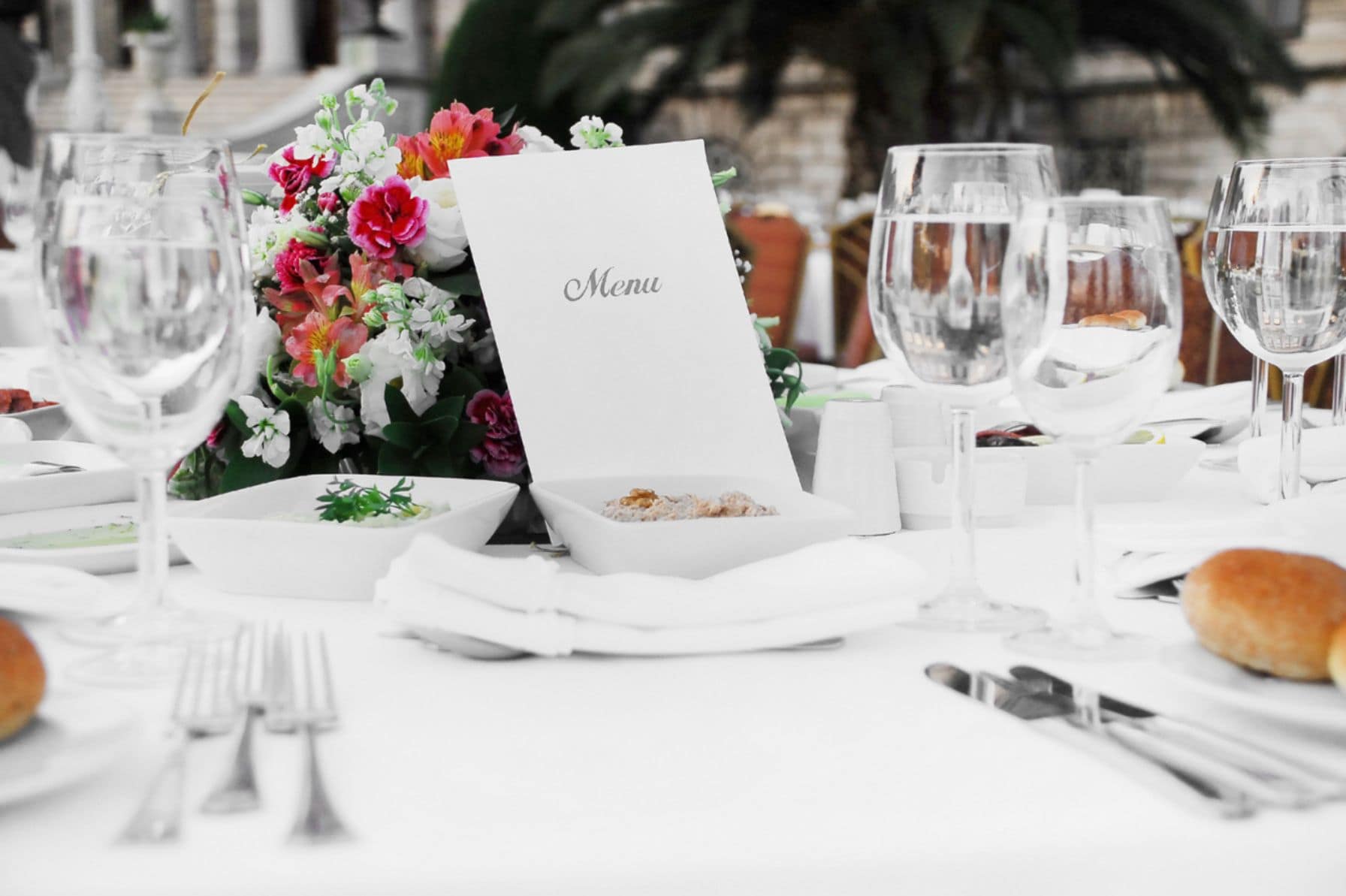June 1, 2023 • 7min read
How to Accommodate Dietary Restrictions in Your Wedding Menu

Even though wedding menus are usually delicious, with plenty of options for every guest, they don’t always have the best reputation. There are plenty of wedding menus out there, and most of them focus on meat lovers. But what about those who are restricted to a plant-based diet? Or how about those with celiac disease or who only eat halal meat? You’ll need to consider them too.
When we talk about what couples want to have at their wedding in terms of food, you’ll need to assume that a small fraction of your guests will have dietary restrictions. There are plenty out there, including life-threatening allergies to just lifestyle preferences.
Regardless of the reason, it’s important to have food available for all your guests as they have made an effort to be there on your special day. Indeed, it can be overwhelming to think about their restrictions. You might have a few questions about it, including the etiquette for accommodating people and how you should ask about your guests’ allergies on an invitation.
We’ll give you all the options in this article.
Putting Dietary Restrictions on Wedding RSVP
We recommend asking about your guests’ food allergies on invitations. It’s the easiest way to find out what’s coming and their dietary needs. You can encourage your guests to use checkboxes to make things easier.
Need Professional Wedding Catering Services?
"(Required)" indicates required fields
"(Required)" indicates required fields
This won’t only tally on who needs what easier but avoids the entire “I don’t like pickles” thing. If one of your guests doesn’t like pickles, they can just not eat them. But it’s an entirely different story when someone is allergic to pickles.
Here is a list of the most common dietary restrictions:
- Nut allergy
- Shellfish allergy
- Being vegetarian or vegan
- Only eat halal or kosher
- Needing gluten-free food
You can get direct answers from your guests about their dietary restrictions by having a section on the invitations where they can inform us. You can then reach out to that guest once they get their RSVP and find out what they need and shouldn’t have.
Talk to the Chef or Caterer
It’s important to have a conversation with the caterer or even the chef about dietary restrictions. However, you also shouldn’t take their word for it. Your wedding planner should have a list of chefs who cook delicious allergy-friendly dishes.
It’s also crucial to find out what they can accommodate and what they can’t. This is especially important due to cross-contamination as if your guests have any food allergies, cross-contamination should be entirely removed. Catering kitchens usually have separate sections because of this, but it’s best to make sure and always check it.
Do Dietary Restrictions Increase Wedding Costs?
Accommodating dietary restrictions will likely cost couples a bit more than usual. However, McHale’s Catering states, “Recognizing and accommodating your guests’ dietary restrictions is an important part of hosting a wedding reception.”
These are very true words. If you want everyone you invite to come to the wedding, you need to make sure your guest is cared for regarding food, regardless of the reason. It’s your responsibility, along with the wedding planner and caterer, to ensure you meet your guests’ needs. You also need to make sure that the dietary restrictions are clear; you wouldn’t want to mix up vegetarian and vegan menus after all!
A hospital bill or a lawsuit for an allergic reaction will cost you significantly more than an extra plate or two.
Wedding Menu Ideas
When building your wedding menu, it’s essential to know all the dietary options that you want to accommodate. Make sure to discuss it with your caterer beforehand as there’s nothing worse than telling them two weeks before the wedding that you need to prepare halal food when it’s never been discussed before.
Here is an easy breakdown of the most common dietary restriction menu.
Gluten-Free Menu
Gluten-free is an important dietary restriction, whether it’s only gluten intolerance or Celic’s disease. Most recipes today can be changed to be gluten-free.
However, cross-contamination is a serious concern for these kinds of meals, and they are usually prepared in different parts of the kitchen. There are many gluten-free alternatives today and a robust gluten-free culinary world. It should be a common offering from caterers and chefs nowadays.
Halal and Kosher Menu
If you have Muslim or Jewish guests, they can only have halal and kosher food, respectively. These are more religious laws than styles of cooking. Therefore, these foods must be sourced from a reputable place and prepared in a certain way. Ensure a chef is capable of cooking these dishes so all the rules are followed.
Vegetarian Menu
We all know vegetarians don’t eat meat, but there are a few exceptions as some may eat fish. That’s something that you’ll need to ask. Vegetarians also consume animal products such as milk, yogurt, cheese, and honey. The rest is safe as long as the menu isn’t the animal itself. As dairy products are allowed, vegetarian menu options are easy to accommodate and standard offerings for any caterer.
Vegan Menu
Vegans, like vegetarians, are also subscribed to a plant-based diet. However, vegans are restricted to only plant-based diets. They don’t eat any products from animals like cheese, milk, honey, or even wear leather. Vegans don’t eat or wear anything that comes from an animal.
A vegan menu for a wedding reception must be 100% plant-based. There are plenty of substitute options and you’ll likely find that vegans don’t like the meat’s texture or the idea of eating meat-like dishes. Or you can opt for vegan croquettes containing chickpeas instead of eggs.
Related Articles
How to Shoot Wedding Food Photography
Food-Themed Pre-Wedding Shoots for Foodie Couples
Have to decide how your dream wedding will look like?
Lorem ipsum dolor sit amet, consetetur sadipscing elitr.



